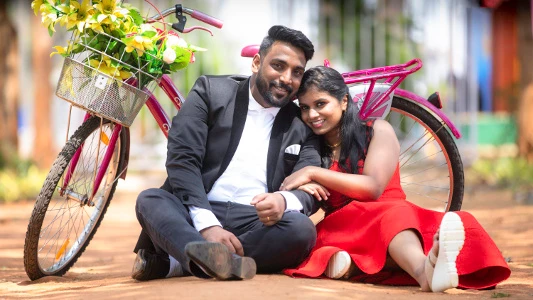My shock type 2 diabetes diagnosis

In September 2012, I had a medical emergency that saved my life.
I was 39 years and 6 months old, working in a public school in Kerala as an instructor in vocational training. I’d been suffering from hyperthyroidism and goitre for about 6 years. Goitre had enlarged the lower part of my throat, and I was seriously considering surgical treatment for it.
At that time, my colleagues and I regularly played badminton. But for more than 3 months, I’d been feeling low energy. Then, one day during play, I felt extreme exhaustion. I was so fatigued and thirsty and drank a lot of water. But even after drinking water, I remained tired and couldn’t complete the game.
After this incident, I was very anxious about my extreme fatigue. I also needed to urinate frequently at night. And thinking back, 2 months before I’d had a small wound on my finger that took a long time to heal. At the time, I wasn’t aware these were symptoms of diabetes and didn’t believe I could have it.
A week later, I consulted with a surgeon about treatment for my goitre and he suggested partial thyroidectomy. I booked the surgery and was admitted to the hospital 2 days before. Following the usual pre-surgery procedure, the doctor tested my postprandial (after meal) blood sugar level, fasting blood sugar level, blood pressure, electrocardiogram (ECG), etc.
Then, 1 day before my pre-planned surgery, my doctor informed me I was type 2 diabetic – My fasting blood sugar level was very high (360 mg, while a non-diabetic’s would be less than 100 mg).
After my diagnosis
My diabetes diagnosis was shocking news for me. I just didn’t want to accept it – Denial can be a common feeling for people when first diagnosed with type 2 diabetes.
I felt my diagnosis was unacceptable. I was disappointed and argued with my doctor. I told him, “These results aren’t mine. They belong to someone else.” I made him retest and send my blood to a different lab.
The doctor did retest, but unfortunately, there was no change in the results. We didn’t change the pre-planned date of my surgery, but he went over my treatment plan considering my new diagnosis – He advised me to take insulin injections once a day. I was very confused by my high blood glucose level, but my doctor encouraged me a lot.
6 days after my successful surgery, I was discharged from the hospital. And taking insulin injections, my blood sugar level gradually decreased. I kept taking insulin injections until the wound from my surgery was completely healed, and then my doctor prescribed a tablet to take once a day to replace my injections.
My doctor also stressed to me the importance of managing my diabetes, because leaving it unmanaged could result in serious complications. These could include:
- Neuropathy (damage to the nerves)
- Retinopathy (damage to the eyes and vision)
- Nephropathy (damage to the kidneys)
- Heart disease
He also emphasised the danger of neuropathy and peripheral neuropathy (damage to the nerves in the arms and legs) – It’s caused by damage to the nerves outside and brain and spinal cord and may lead to amputation.
And he was very clear that to prevent these complications I needed to start taking care of myself. He told me, “Mismanagement of diabetes is like playing with fire. And diabetes self-care is crucial because 90% of diabetes management is done by you. To be successful, you need to grow your knowledge.”
Learning to live with diabetes
For me, it wasn’t easy to live with diabetes. At the time, I didn’t know much about the disease and didn’t know anyone who was living with type 2 diabetes and could help me understand it. The only diabetic I knew was my father, who had been a diabetic since he was 36. But he was a rural farmer, very physically healthy, and I’d never seen him take any medication for it.
On the last day of my hospitalisation I consulted a dietitian. He advised me which food items were suitable for diabetes patients. They include:
Non-starchy vegetables
- Broccoli
- Carrots
- Greens
- Peppers
- Tomatoes
Fruits
- Oranges
- Melon
- Berries
- Apples
- Bananas
Grains (at least half for the day should be whole grains)
- Wheat
- Rice
- Oats
- Cornmeal
- Barley
- Quinoa
Protein
- Lean meat
- Chicken or turkey without the skin
- Fish
- Eggs
- Nuts and peanuts
- Dried beans and certain peas (such as chickpeas and split peas)
- Meat substitutes (such as tofu)
In the beginning, it was very difficult for me. But by making small changes here and there it gradually got easier and I started eating better (almost always the right food at the right time and in the right quantity). I also made sure to stay physically active and take my medications as prescribed by my doctor.
Final thoughts
Proper diabetes management requires routine monitoring of blood glucose levels, along with diet and lifestyle changes.
I think diabetes is scary, but you have a choice. You either manage your diabetes, or you let it manage you. And if you manage it properly, it doesn’t have to govern your life.
Looking for more stories like this?
Lisa is a type 2 diabetic. When she married, she quickly realised she’d have to work out how to manage her diabetes with her husband, and how he could help.
When Nirvaanika was first diagnosed with type 2 diabetes, she was only worried about her blood sugar. But then she started planning a family.
Lisa is a type 2 diabetic. When she married, she quickly realised she’d have to work out how to manage her diabetes with her husband, and how he could help.








